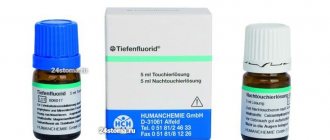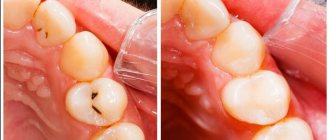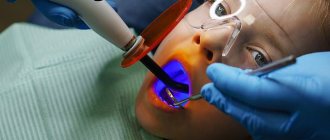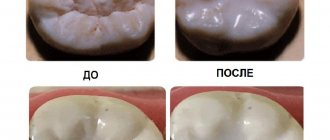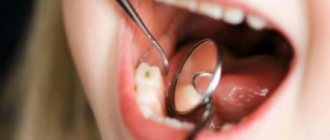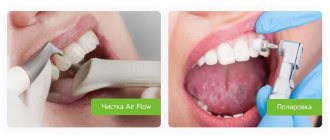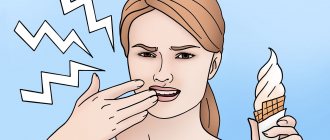What are dental fissures
There are fissures on both baby teeth and permanent teeth.
These are physiological folds - grooves, dimples and depressions - on the chewing surface of molars and premolars. The incisors and canines do not have fissures. Such cavities easily and quickly fill with plaque, are poorly cleaned with toothpaste and a brush - they become a common cause of carious lesions. Pediatric dentists often suggest sealing fissures - creating a thin film on the surface of the crown that will protect against pathogenic microflora and mechanical damage.
There are two main reasons for fissure sealing:
- Children's inability to take good care of their teeth. Even the most responsible child is not able to clean all the cavities on the surface of molars and premolars, which leads to the development of caries and the need for treatment. Especially if the grooves differ in depth and tortuosity.
- Thin enamel of teeth - milk and permanent during the period of change of bite. The thickness of the enamel of temporary units is half that of permanent ones, which explains its rapid destruction and susceptibility to caries. During eruption, molars are especially vulnerable - initially the crowns are covered with thin, slightly mineralized enamel, and only after 2-3 years the surface becomes resistant to external damage.
Rodikova Tatyana
Before recommending invasive fissure sealing to a patient, I always look at the initial level of mineralization. With a high mineral content and wide grooves, sealing cavities can be easily done without sealing, but there are cases (low mineralization, prone to caries) when sealing the teeth is the best option!
Reasons for appearance
The development of caries occurs when bacteria penetrate into the tooth or when they are exposed to tooth enamel for a long time. The main reason for the appearance of pathology is poor oral hygiene. Insufficiently thorough cleansing of the oral cavity from plaque, which accumulates daily, leads to its accumulation and the appearance of deposits. Bacteria “corrode” tooth enamel, penetrate into subgingival pockets and microcracks, provoking the development of an infectious process.
In addition to poor dental hygiene, other factors can cause tooth decay.
General factors.
- Deficiency of vitamins and minerals.
- Diseases of the immune system.
- Hormonal disorders.
- Diabetes.
- Effect of high or low temperatures.
- Heredity.
Local factors.
- Contains a large amount of acid in saliva.
- Weakened enamel.
- Pulp and periodontal pathologies.
- Malocclusion.
- Deviations in teething.
- Congenital anomalies of the dental system.
- Anomaly in the biochemical composition of dental bone tissue.
Excessive consumption of sweets is often attributed to the causes of tooth decay. In fact, the sugar contained in such foods does not have any negative effects if the teeth are healthy and properly cared for. Sweets that cause active production of saliva with high acidity, of course, cause caries, but only in combination with other provoking local factors.
Treatment of baby teeth against caries: indications
Typically, fissure sealing is carried out at the request of the parents. But sometimes dentists recommend the procedure, since sealing fissures reduces the risk of developing caries in milk and permanent teeth. The indications are:
- Young age of the patient. The enamel of newly erupted teeth has a thin layer. It is not sufficiently saturated with fluorine and calcium and is susceptible to destruction.
- Pathologically thin enamel. Sometimes the structure of tooth enamel does not change over time - it remains thin and susceptible to microorganisms.
- Curvy and narrow grooves on the teeth. The complex shape makes daily high-quality teeth cleaning impossible.
- Malocclusion and abnormal position of molars and premolars.
- Insufficient oral hygiene.
- Primary signs of enamel demineralization are stains on the tooth surface and superficial caries.
Among the contraindications:
- Carious lesions - sealing is allowed after dental treatment.
- Wide and open fissures - accessible for everyday high-quality cleaning with toothpaste.
- Allergy to sealant coating - instead of sealing, enamel silvering, remineralization, and fluoridation are available.
- Heavy salivation.
- Long-term eruption of a baby or permanent tooth – more than 4 years ago.
Dental examinations: when to start and how often to visit the doctor?
The first visit to the dentist should be made as soon as the first tooth has erupted. It is important to choose the right clinic, because how the baby’s first contact with the doctor occurs will largely determine his attitude towards dentists and dental treatment in the future.
At the VilmaDent clinic, all conditions have been created to ensure that the first dental examination becomes not a stress, but a fun game, an interesting adventure. We have certified doctors who specialize in working with children and know how to find a common language with them.
SIGN UP
During the first visit, the doctor will examine the little patient’s teeth, give parents a lot of useful information and answer all questions. In the future, you need to visit the dentist regularly. Our doctors try to schedule frequent visits for children - every 3 months, so that the child quickly gets used to the office and doctors and stops being nervous. It is important to show up for checkups on time, even if your teeth don’t hurt. Superficial caries can be treated without the “scary” drill. The doctor can also carry out some hygiene procedures that will protect the teeth from “holes.”
Seal your child’s teeth from caries: how fissure sealing is carried out
Fissure sealing is a painless and short procedure. To carry it out, a “sealant” material, a fissure sealant, is used. Sealant is a high-strength composite composition that hardens under the influence of light. Its feature is increased fluidity, thanks to which the sealant is able to fill even hard-to-reach places on the tooth crown. Also among the advantages of the sealant:
- Waterproof – resistant to saliva.
- Durability – the coating lasts on the teeth for up to 5 years.
- Aesthetics - sealants are produced in transparent, beige, and colored.
Stages of fissure sealing of primary and permanent teeth:
- Removing plaque from enamel and all cavities. Polishing the crown surface.
- Treatment with an antiseptic composition.
- Drying teeth and protecting the treated unit from the influence of saliva.
- Application of acid gel to enhance adhesion and create a slightly rough surface.
- Rinse off the composition and dry the tooth.
- Filling fissures with liquid sealant - applying sealant.
- Creating conditions for hardening - chemical activation or using a light lamp.
- Removing excess material.
- Coating the tooth with a fluoride-containing strengthening gel.
The optimal age of a child for fissure sealing is 6-8 years. During this period, the first permanent molars erupt and need protection. The procedure is indicated for children aged 1.5-2 years, and adolescents aged 12-14 years. The appearance of any wide tooth is a reason to carry out dental sealing and reliably protect the enamel from destruction for several years.
Plaksina Margarita
I am often asked what they cover children's teeth with to protect them from caries. At Aza&Buka we use sealants - special gels. They not only seal the surface of the tooth, but also strengthen the enamel by releasing fluoride ions.
It hasn't started yet
By the age of three, children have a full set of 20 baby teeth. And all kinds of sweets begin to appear in the children's diet, which provokes the appearance of the first “holes” (cavities) in the teeth. Doctors today are trying to treat such caries using innovative technologies without preparation (without using a drill), which creates the most comfortable conditions for children.
Among the popular methods:
ICON is a new, safe technology for the treatment of caries at the initial stage without preparation. Hard tooth tissues are treated with a specially developed chemical preparation, which, entering the capillaries of enamel and dentin, prevents the spread of caries.
Ozonation is a method of treating caries of primary teeth using ozone. It is considered the most reliable and effective way to protect children's teeth from decay. This painless method allows you to disinfect affected tissues using ozone molecules and destroy all cariogenic microorganisms in the diseased tooth.
Professional mechanical teeth cleaning Air Flow (air-kinetic treatment) is a silent process of non-contact treatment of carious cavities using air flow. The surface of the teeth is treated under pressure with an aerosol jet that contains water, air and abrasive powder based on sodium bicarbonate (soda), after which the tooth enamel is fluoridated.
Avoid losses. What dental diseases are important to cure immediately? Read more
Methods for filling children's teeth against caries
There are different ways to seal baby and permanent teeth. In the capital's dentistry they offer:
- Non-invasive sealing - the procedure is carried out without compromising the integrity and structure of the tooth. The method is suitable for healthy teeth with a wide distance between the cusps on the crown. The doctor sequentially applies the compounds, closing and protecting the cavities.
- Invasive sealing - the doctor processes the enamel for better access to hidden areas on the surface of the molar in the presence of narrow and deep fissures. The procedure is also indicated if it is necessary to treat caries.
Dolotova Marina
Experience shows that sealing fissures reduces the risk of developing caries several times. This can be seen if we observe patients with a similar enamel structure and attitude towards dentistry. Children with sealed fissures keep their teeth intact and healthy for a long time.
Treatment of dental caries in young children
Despite simple advice on how to prevent dental problems, we often treat caries in children at an early age.
The peculiarity of treating children is that it is difficult for them to sit in a chair for longer than 20–30 minutes. If we are talking about caries of one tooth at the first or second stage, the pediatric dentist will have time to deal with it during this time. But what if serious inflammation occurs and the process moves into deeper tissues? In this case, and also if the child is not yet 4 years old, pediatric dentistry approves the procedure under anesthesia. It is safe - the drug, which is used by doctors all over the world, is non-toxic, does not harm health and disappears from the body instantly as soon as its supply is stopped.
We regularly talk about the treatment of children under anesthesia in this section. If your child is having this procedure, the doctor will explain everything in detail in advance.
In conclusion, I would like to remind you that it is time to make an appointment with a pediatric dentist in Krasnoyarsk for preventive care. If you have not yet started regularly taking your children for checkups, do so today to give them always healthy teeth and correct bite in the future.
How to protect baby teeth from caries
Fissure sealing is an effective method of caries prevention. But you can't rely on the dental procedure alone. To maintain and preserve the health of children's teeth it is also necessary:
- Proper nutrition - more solid vegetables and fruits, fermented milk and dairy products, minimizing sweets.
- Systematic dental care - you need to brush your teeth twice a day, and when correcting your bite with braces, after every meal.
- Scheduled visits to the doctor - dentists invite you for an appointment every six months, and sometimes more often.
- Selection of toothpaste and toothbrushes according to age - when purchasing care products, you should focus on the dentist’s recommendations.
Pediatric dentistry today offers non-invasive and invasive techniques for fissure sealing. When choosing a doctor, you should focus on the dentist’s experience, reviews and recommendations. To increase the effectiveness of the procedure, make an appointment immediately after the chewing surface has erupted - when the crown becomes visible and accessible for treatment.

